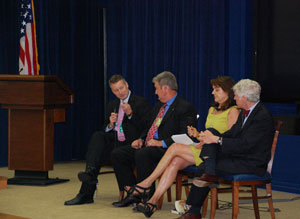NEH Previews Ken Burns’ THE DUST BOWL at White House

Photo by Lucy Cutrona for the National Endowment for the Humanities.
The new Ken Burns film, The Dust Bowl, headlined an “NEH at the White House” event July 26 as prominent panelists discussed the history of what filmmakers call “the worst man-made ecological disaster in U.S. history.” The two-part, four-hour film chronicles the monumental dust storms and lethal drought that devastated the Southern Plains states for a decade in the midst of the Great Depression. The National Endowment for the Humanities-funded The Dust Bowl premieres on PBS stations across the nation on November 18 and 19th, 2012.
“Given the drought that today besieges a great swath of the corn, soybean and wheat belt, a sense of contemporary tragedy looms over the historical events chronicled in The Dust Bowl,” said NEH Chairman Jim Leach. “Normally, it is positive to suggest that a film is timely. Unfortunately, timeliness, in this case, has a traumatic dimension.”
The preview screening was followed by a panel discussion moderated by Ann Yonkers, the co-director of FRESHFARM Markets, a nonprofit organization that promotes local produce and farmers’ markets; Lester Brown, president and senior researcher for Earth Policy Institute, author or co-author of more than 50 books and a MacArthur Fellow; Timothy Egan, New York Times Opinionator columnist and author of the National Book Award-winning The Worst Hard Times; and Clay Pope, a sixth-generation Western Oklahoma farmer who is the executive director of the Oklahoma Association of Conservation Districts (OACD).
The Dust Bowl “story is not over yet,” Brown said. “We think it is part of our history, but it is our past, our present, and our future. We don’t know if this an isolated problem this year, or something we’ll have to contend within the long term… The policies that will impact these problems are not agriculture policies, but population policies, and energy policies.
“More and more the agricultural system and the climate systems are out of sync. We haven’t faced this and we don’t know how to face this challenge.”
The Dust Bowl is a powerful film that does what filmmaker Ken Burns, producer of The Civil War, Baseball and Jazz, does best. It captures an epic historical event by bringing to life the smaller human stories that make it real, according to Karen Mittelman, director of the NEH Division of Public Programs. The Dust Bowl is co-produced with Dayton Duncan and Julie Dunfey.
“It was a great honor to take part in this event,” Pope said. “It’s been said that those who forget the mistakes of the past are doomed to repeat them in the future. That, in my mind, pretty much sums up the importance of this new documentary on the Dust Bowl—we have done much to turn back the tide of dust that swept the southern plains in the 1930s, but if we are not vigilant, we could see this monster rear its head again. If those of us who live and work the land forget the importance of soil conservation or if the policymakers in Washington, D.C., and at our state capitols turn their back on conserving our natural resources, we could see this kind of disaster again. This story needs to be told.”
Bill Wilson, past president of both OACD and the National Association of Conservation Districts, and Sarah Pope, OACD Special Projects coordinator, also attended the event.
